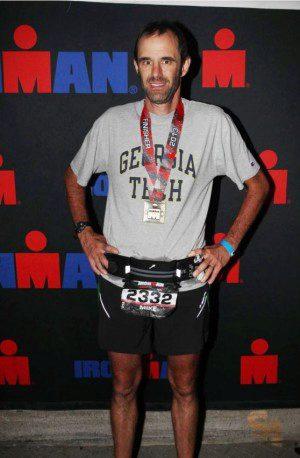
They are a luxury he doesn't afford himself.
On August 25, the civil engineering professor and father of two completed his first-ever Ironman competition. That's 112 miles of biking, 26.2 miles of running, and 2.4 miles of swimming. He completed the Louisville, KY race in about 14 hours.
"Finishing a race like this one, when you've been training, is a lot like going into your thesis defense when you are going for your Ph.D.," he said recently.
"It's difficult, sure, but by the time you're there, you've done all of the work to prepare, and you kind of know whether you're going to make it or not."
Of course there were moments...
"I think I was at about mile 18 [running], and I was feeling kind of queasy, and I'm thinking 'Is this worth it?' but then I ran into my daughter [Mia, 9] who said 'Daddy, you have to promise you'll finish this race' And what could I say? No?"
As any Ironman participant, Bergin invested a lot of time training for the race, rising as early as 5 a.m., six days a week, to get a run in before work. At lunch, he often jogged over to the Georgia Tech pool to get in a swim, and on the weekends, there was at least one day that was given up to either running or biking.
"So it got down to being one-day weekends towards the end, because you have to put in the training," he said. "In the end it was hard because I was always tired."
But he always rummaged around and found a reason to persist, too. Sometimes, he admits, he pushed himself to train hard because he had plunked down $650 to enter.
"And you know, that's non-refundable, so I had to keep going."
A few months before the race, he injured his hip and his collar bone in a pretty serious cycling accident .
"My buddies who were riding with me, they ripped off my shirt, looked at it, and they said 'nah, that's nothing, let's go.'"
And so he did.
As he got closer to racetime, he began ensuring his success by making failure more humiliating: the normally tight-lipped athlete began telling friends, colleagues and even students about his impending challenge.
"I never take personal days or sick time, but the week before the race, I announced to my class that I was taking a day off for this race," he said. "And when I told them that I was doing this, not everyone knew what the race was, but I knew that I had to finish it no matter what because now they knew."
About a month before racetime, he had a prime opportunity to slack off on training, when an already-scheduled work trip took him to India for research.
"That was really crazy -- running through ghettos when it's 100 degrees out, the air is dirty, and there are dogs chasing you, and people are looking at you, and you wonder what they're thinking about you," he said. "But then I thought: well I could be sitting on my butt in India or running through the streets. I think running is better."
To pace himself throughout his training and--especially on race day--Bergin purchased a fairly expensive gadget that measured his heart rate, his gait, and other statistics.
"I don't know what happened to that, but when I got out of the water, it was gone," he said. "I had to do the rest of the race not knowing what my pace was or how to gage my speed. That was no fun."
But fun, at that point, wasn't the goal.
"A lot of my riding friends are race-motivated. It's all about the excitement of race day," he said. "But, for me, it's the process of training, the mental challenge of telling yourself that you're not going to quit when you want to quit. That you're going to pick up the pace when you're in the pack, and challenge yourself. That's more of an internal battle and I like it."
"I think everyone should have something like that to keep them going."
